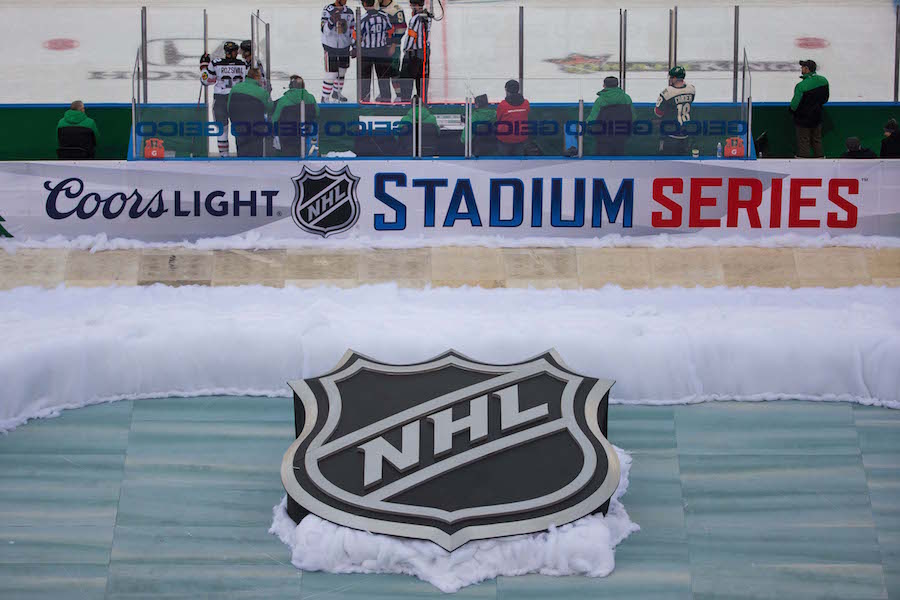“Saturday there’s a hockey game at a baseball stadium? What are they going to honor a football team!?!”
That very confusing statement came from the mouth of Mile High Sports Magazine editor-in-chief Doug Ottewill. While it was meant in jest, there’s a simple truth to his words when you read between the lines. As currently constructed, the Stadium Series doesn’t make sense.
True, Saturday’s game between the Avalanche and the Red Wings has created some buzz in Colorado (although not as much as the Super Bowl champion Broncos). There are some hardcore hockey fans excited and there are some casual hockey fans excited. But, in reality the vast majority of people just aren’t interested.
Maybe it’s because the cheapest ticket you can find on seatgeek.com is $131 and located in the Rockpile (good luck seeing any of the action from there). Or, maybe it’s because, over the course of an 82 game season, it’s hard to get excited about a non-divisional matchup in late February – even if it is against the once-hated Red Wings.
For an event (let’s call it what it is) of this magnitude to survive it has to appeal to the masses. The hype has to extend beyond hardcore hockey fans and socialites with deep pockets. This is where the Stadium Series has fallen short, because it’s failed to do just that. The average hockey fan (or rational person) doesn’t want to pay $131 to watch a hockey game through binoculars. Hell, you can’t even see the crappy Jumbotron at Coors Field from the Rockpile. (Side note – the Jumbotron at Coors Field is seriously embarrassing.)
That’s not to say that outdoor games have been a failure for the NHL, because they aren’t. The Winter Classic has been a huge success. It’s an event hockey fans look forward to watching on New Year’s Day. It’s created lasting memories (the first game ended in a shootout, in a blizzard!), great games and something to look forward to each year. The problem started when the NHL decided to create the Stadium Series, a classic case of trying to expand too far, too fast. The NHL has a rich history of overreaching.
Look no further than NHL expansion for an example. They moved a franchise into a desert, two into a swamp and one into a city with the nickname “Hotlanta.” The Thrashers are now in Winnipeg, any time there’s rumors of a team changing cities both Florida teams are mentioned and the NHL had to use all its might to keep the Coyotes in Arizona.
It was too much too fast. The same can be said about expanding outdoor games to Los Angeles, Santa Clara, Minnesota (which didn’t sell out last weekend) and Denver in late February. Sure, the idea looks great on paper, but it just doesn’t work in reality. Trying to turn a non-division game in late February into an event is never going to work.
There are much more efficient ways for the NHL to build on the success of the Winter Classic.
They could start by turning the Winter Classic into a double-header. Have a single city host two games; play one on New Year’s Eve and one on New Year’s Day. Four teams would increase the amount of people interested and if you offered ticket packages to both games people might actually travel to attend.
Or, an even better idea might be to leave the Winter Classic alone (it’s already working), kill the Stadium Series and just play the NHL All-Star Game in an outdoor stadium every year. That’d breathe new life into the All-Star Game and create a much better atmosphere for an event of that magnitude.
The NHL is doing more harm than good by forcing the Stadium Series on hockey fans and teams. It’s not expanding the game by drawing the interest of casual fans or rewarding diehards with a unique hockey experience. The Stadium Series is becoming more and more of an overpriced spectacle. And when reasonable hockey fans, like those in Minnesota, don’t sell out the game because the recognize this they are mocked, which kills their chances of getting the Winter Classic.
Colorado be warned: Shoving a dead rivalry down everyone’s throats doesn’t raise the profile of this floundering event; it only highlights its shortcomings.
